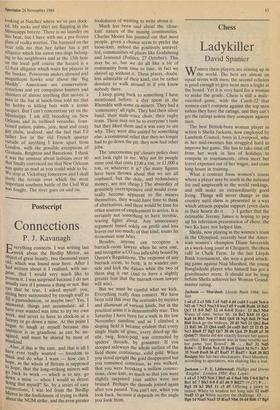Postscript
Connections
P. J. Kavanagh
lverything connects. I was writing last iweek about the Birdlip Mirror, an Object of great beauty, two thousand years old, which was found near here. After I had written about it I realised, with sur- ' Prise, that I would very much like to Possess it. I was surprised because I do not usually care if I possess a thing or not. But Can that be true, I asked myself: you, sating here surrounded by enough stuff to fill a pantechnicon, or maybe two? Yes, I answered; things just accumulate: all I have ever wanted was time to try my own work, and never to have to clock-in at a factory or go down a mine. At this pointI began to laugh at myself because this ambition is as grandiose as can be im- agined, and must be shared by most of Mankind.
Also, if this is the case, and that is all I have ever really wanted — freedom to think and do what I want — how can I hope, as the whole of Britain is supposed to hope, that the long-striking miners will go back to work — which is to say, go citYWn a mine — when I would so detest doing that myself?. So, by a series of easy connections, I was led from the Birdlip Mirror to the foolishness of trying to think about the NUM strike, and the even greater foolishness of wanting to write about it.
Much has been said about the 'close- knit' nature of the mining communities. Charles Moore has pointed out that most people, given a chance seem to prefer the loose-knit, indeed the positively unravel- led, communities of places like Godalming and Jesmond (Politics, 27 October). This may be so, but we do all like a bit of community from time to time, in fact we shrivel up without it. These places, doubt- less admirable of their kind, can be rather desolate to walk around in if you know nobody there.
I keep going back to something I have mentioned before: a day spent in the Rhondda with some ex-miners. They had a 'community' all right. They had their silver band, their male-voice choir, their rugby team. These may not be to everyone's taste but they liked them and it was easy to see why. They were also united by something else: a communal relief that they no longer had to go down the pit: they now had other jobs.
The 'uneconomic pit' closure policy does not look right to me. Why not let people mine coal that costs £100 a ton, or £1,000 a ton, or whatever it is? (So many figures have been thrown about that we are all confused, but the dole, and redundancy money, are not cheap.) The absurdity of genuinely overexpensive coal would even- tually become apparent to the miners themselves, they would have time to think of alternatives, and there would be time for other sources of employment to arrive. It is certainly not something to have terrible, tearing fights about. Any unnecessary argument based solely on profit and loss leaves out too much; of that kind, toutes les economies soft bêtes.
Besides, anyone can recognise a barrack-room lawyer when he sees one, and recognise a CO too inflexibly bound by Queen's Regulations. The response of any barrack room, to both, is to wander out- side and kick the daisies while the two of them slug it out (and to have a slightly greater fear that the barrack-room lawyer will win).
But we must be careful what we kick. Everything really does connect. We have been told this over the centuries by mystics and illuminati of various kinds, but in the practical sense it is demonstrably true. This Saturday I have been for a walk in the low November sunshine and as I climbed a sloping field it became evident that every single blade of grass, every dried-up thi- stle, twig, fence-post, was connected by spiders' threads, by gossamer. If you stooped sideways the whole surface of the field shone continuous, solid gold. When you stood upright the gold disappeared but you remained conscious, as you walked, that you were breaking a million connec- tions, close-knit; so much so that you were slightly surprised your ankles were not bruised. Perhaps the threads joined again after you passed. You can't see, when you look back, because it depends on the angle you look from.






















































 Previous page
Previous page